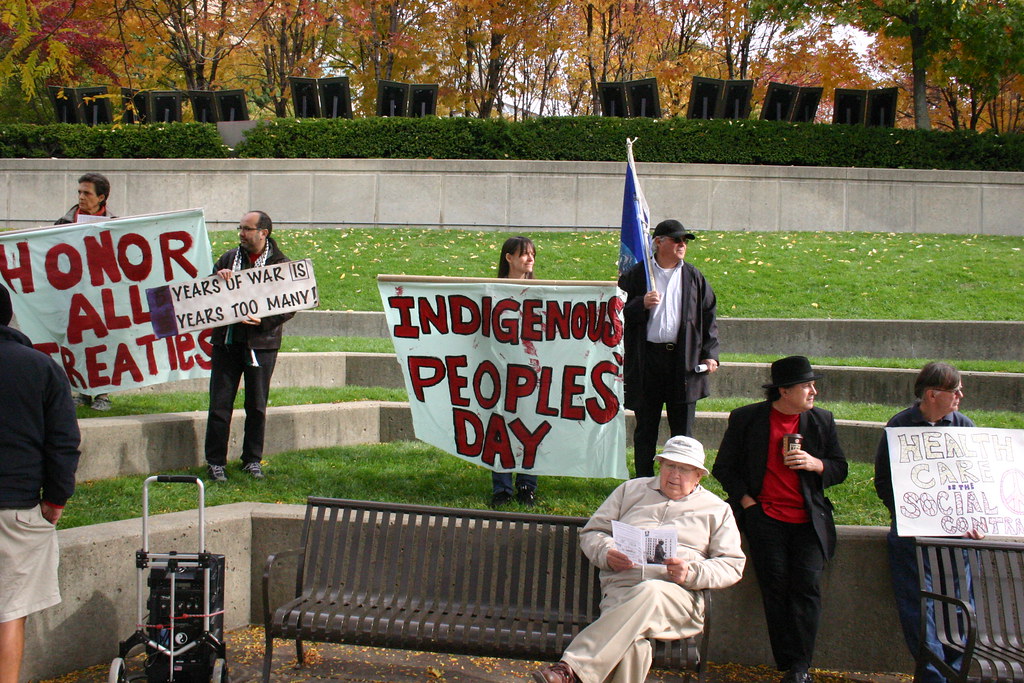Views expressed in opinion columns are the author’s own.
When I was around six years old, I remember putting on a cardboard headband with paper feathers stuck to it to represent some stereotypical image of a Native American person in the annual school play about the first Thanksgiving. I was only a kid, but the shame for wearing such an outfit in the retelling of a whitewashed myth about Thanksgiving stays with me today. There is something deeply harmful about how we normalize the stories that make settlers look like good people, especially when we use those narratives as the foundation for our national identity. As Americans, we must acknowledge settler violence and the impact it’s had on indigenous communities, as well as how we benefit from it.
In the time between Indigenous Peoples Day to Thanksgiving Day, I tried to educate myself on whose land I live on, the history of Native American oppression and how to support indigenous people as someone who isn’t. I certainly am not an expert and encourage better suggestions for how I can help, but as National American Indian Heritage Month draws to a close, I want to share what I’ve learned from listening to indigenous people and reading about the subject.
Among the most important things I learned about is the ongoing issues Native Americans and Native Alaskans face in the U.S., both in urban and rural settings. Indigenous people make up fewer than 5 percent of the world’s population, but they safeguard around 80 percent of global biodiversity, according to National Geographic. The resilience and devotion indigenous communities from the Amazon to North Dakota put toward protecting their land is part of the reason they are constantly under attack from governments and industries.
Additionally, while indigenous people in certain parts of the world have access to coveted resources, many Native Americans in the U.S. struggle with access to food and clean water. One in four Native Americans in the U.S. grapples with food insecurity, and Native Americans are 400 percent more likely to report that they don’t have enough to eat. This is especially sobering given that just last week, many of us feasted on a day that many tribes observe as a National Day of Mourning.
While it’s impossible to cover the full range of atrocities and injustices indigenous people have suffered and continue to experience, there are a few things we non-natives can do to educate ourselves and support Native American organizations that are doing critical work.
There are a ton of amazing native activists, politicians, and artists working throughout the U.S. whom we can follow or financially support. As the holidays approach, consider supporting native-owned businesses when buying gifts. It goes without saying that this should not be done in the spirit of appropriation. If you happen to find non-native businesses illegally profiting off of native designs, you should report them to the Indian Arts and Crafts Board.
If you want to support organizations working for and with Native Americans and Native Alaskans, there are countless options. The Native American Food Sovereignty Alliance is fighting to end food insecurity among indigenous people in the U.S., and you can also donate to the Lakota People’s Law Project if you are passionate about the intersection of climate issues and indigenous rights. Indigenous Women Rising runs an abortion fund for native women in crisis in the U.S. and Canada which you can support here.
Even here at the University of Maryland, we can stand in solidarity with indigenous people. The American Indian Student Union is trying to gather signatures for a petition that asks the university to formally acknowledge that it is built on Piscataway Conoy land. Educating ourselves and acknowledging the history of settler colonialism in America is hugely important, and you can even easily learn which tribe’s land you’re living on.
America’s whitewashed history is a hard thing to unlearn. Fortunately, there are many resources available to start having a positive impact. As National Indian American Heritage Month draws to a close, let’s commit to being better. We might not be able to go back in time, but we can help create a better future.
Caterina Ieronimo is a sophomore government and politics major. She can be reached at ieronimocaterina@gmail.com.



